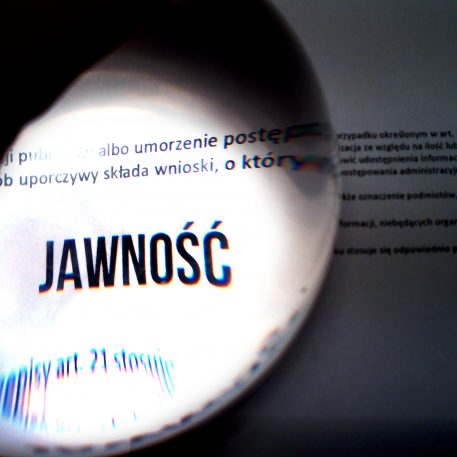
HFHR issues opinion on proposed law on transparency of public life
The Government has submitted a proposal of public life transparency law for public consultations. The draft law establishes new rules of access to public information, expands the applicability of the obligation to file property statements and introduces provisions protecting whistleblowers. The Helsinki Foundation for Human Rights has submitted a legal opinion on the measures proposed in the draft.
Short deadline for comments
The works on the draft law commenced in January 2017. After 10 months the proposal was officially notified with a short time-frame for the presentation of comments (the deadline expired on 3 November 2017).
The proposed law revokes the Access to Public Information Act, replacing it with new rules of access to public information, according to which access can be denied on the grounds of a requester’s “persistence” in filing applications. As the HFHR notes, the proposed changes fail to address existing problems such as a backlog of processed applications.
Grim future for public consultations
The draft law also changes the rules of participation in the lawmaking process. It does not set any standards of the public consultation process in respect of legislative proposals presented by the Government or parliamentarians. According to the draft, in the situation where the Government does not launch public consultations, the lobbying procedure is the only available route for presenting opinions on a proposed piece of legislation. However, the proposed law imposes strict disclosure obligations on all stakeholders involved in lobbying activities, including an obligation to disclose all sources of financing, and makes non-compliance punishable with criminal sanctions. Any failure to disclose all required information is to forfeit a stakeholder’s right to voice an opinion about a proposed law. Also in this respect, the newly proposed law on the transparency of public life fails to properly address transparency issues troubling the legislative process in Poland, such as the absence of an obligation to hold public consultations on parliamentarians’ legislative proposals within a reasonable period of time for presenting opinions by stakeholders.
More powers for Central Anti-corruption Bureau
The draft law also extends the powers of the Central Anti-corruption Bureau. The CAB is to be responsible for “revealing and preventing cases of incompliance with provisions of the law on transparency”, which itself will combine the already existing norms that prohibit the cumulation of mandates with access to public information laws and provisions governing lobbying activities. The proposed law authorises the CAB, for example, to collect telecommunication and online data for this purpose. The draft law establishes severe sanctions that may be imposed on businesses for their failure to comply with its provisions, setting the cap amount of imposable fines at a whopping 10 million zlotys.
Whistleblowers without proper protection
The proposed provisions that seek to protect whistleblowers have much to be desired. The proposed law affords remedies only to those insiders who report certain types of violations, such as corruption or money laundering. Even then, an award of protection to a whistleblower entirely depends on an arbitrary decision of a prosecutor. The draft law contains an insufficient regulation of internal whistle-blowing systems and offers less-than-adequate remedies under employment law. As the HFHR emphasised in its opinion, whistleblowers should be awarded protection irrespective of the legal nature of their contract with an employer – for instance, protection should also be available for independent contractors or temporary employees. The proposed provisions do not satisfy the international standards of protection for whistleblowers.


06.11.2017
 Cookies EN
Cookies EN